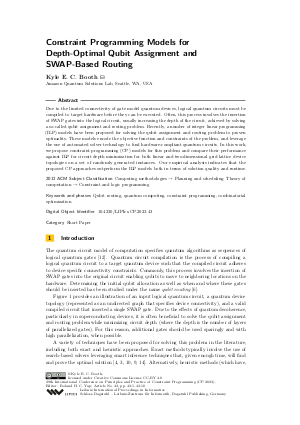Constraint Programming Models for Depth-Optimal Qubit Assignment and SWAP-Based Routing (Short Paper)
Author Kyle E. C. Booth
-
Part of:
Volume:
29th International Conference on Principles and Practice of Constraint Programming (CP 2023)
Part of: Series: Leibniz International Proceedings in Informatics (LIPIcs)
Part of: Conference: International Conference on Principles and Practice of Constraint Programming (CP) - License:
 Creative Commons Attribution 4.0 International license
Creative Commons Attribution 4.0 International license
- Publication Date: 2023-09-22
File

PDF
LIPIcs.CP.2023.43.pdf
- Filesize: 0.56 MB
- 10 pages
Document Identifiers
Subject Classification
ACM Subject Classification
- Computing methodologies → Planning and scheduling
- Theory of computation → Constraint and logic programming
Keywords
- Qubit routing
- quantum computing
- constraint programming
- combinatorial optimization
Metrics
- Access Statistics
-
Total Accesses (updated on a weekly basis)
0PDF Downloads0Metadata Views
Abstract
Due to the limited connectivity of gate model quantum devices, logical quantum circuits must be compiled to target hardware before they can be executed. Often, this process involves the insertion of SWAP gates into the logical circuit, usually increasing the depth of the circuit, achieved by solving a so-called qubit assignment and routing problem. Recently, a number of integer linear programming (ILP) models have been proposed for solving the qubit assignment and routing problem to proven optimality. These models encode the objective function and constraints of the problem, and leverage the use of automated solver technology to find hardware-compliant quantum circuits. In this work, we propose constraint programming (CP) models for this problem and compare their performance against ILP for circuit depth minimization for both linear and two-dimensional grid lattice device topologies on a set of randomly generated instances. Our empirical analysis indicates that the proposed CP approaches outperform the ILP models both in terms of solution quality and runtime.
Cite As Get BibTex
Kyle E. C. Booth. Constraint Programming Models for Depth-Optimal Qubit Assignment and SWAP-Based Routing (Short Paper). In 29th International Conference on Principles and Practice of Constraint Programming (CP 2023). Leibniz International Proceedings in Informatics (LIPIcs), Volume 280, pp. 43:1-43:10, Schloss Dagstuhl – Leibniz-Zentrum für Informatik (2023)
https://doi.org/10.4230/LIPIcs.CP.2023.43
BibTex
@InProceedings{booth:LIPIcs.CP.2023.43,
author = {Booth, Kyle E. C.},
title = {{Constraint Programming Models for Depth-Optimal Qubit Assignment and SWAP-Based Routing}},
booktitle = {29th International Conference on Principles and Practice of Constraint Programming (CP 2023)},
pages = {43:1--43:10},
series = {Leibniz International Proceedings in Informatics (LIPIcs)},
ISBN = {978-3-95977-300-3},
ISSN = {1868-8969},
year = {2023},
volume = {280},
editor = {Yap, Roland H. C.},
publisher = {Schloss Dagstuhl -- Leibniz-Zentrum f{\"u}r Informatik},
address = {Dagstuhl, Germany},
URL = {https://drops.dagstuhl.de/entities/document/10.4230/LIPIcs.CP.2023.43},
URN = {urn:nbn:de:0030-drops-190805},
doi = {10.4230/LIPIcs.CP.2023.43},
annote = {Keywords: Qubit routing, quantum computing, constraint programming, combinatorial optimization}
}
Author Details
References
-
Tobias Achterberg. SCIP: solving constraint integer programs. Mathematical Programming Computation, 1(1):1-41, 2009.

-
Aniruddha Bapat, Andrew M Childs, Alexey V Gorshkov, Samuel King, Eddie Schoute, and Hrishee Shastri. Quantum routing with fast reversals. Quantum, 5:533, 2021.

-
Maurizio Boccia, Adriano Masone, Antonio Sforza, and Claudio Sterle. SWAP minimization in nearest neighbour quantum circuits: An ILP formulation. In Advances in Optimization and Decision Science for Society, Services and Enterprises, pages 255-265. Springer, 2019.

-
Kyle E. C. Booth, Minh Do, J Beck, Eleanor Rieffel, Davide Venturelli, and Jeremy Frank. Comparing and integrating constraint programming and temporal planning for quantum circuit compilation. In Proceedings of the International Conference on Automated Planning and Scheduling, volume 28, pages 366-374, 2018.

-
Adi Botea, Akihiro Kishimoto, and Radu Marinescu. On the complexity of quantum circuit compilation. In Proceedings of the International Symposium on Combinatorial Search, volume 9, pages 138-142, 2018.

-
Alexander Cowtan, Silas Dilkes, Ross Duncan, Alexandre Krajenbrink, Will Simmons, and Seyon Sivarajah. On the qubit routing problem. arXiv preprint arXiv:1902.08091, 2019.

-
Petar Jurcevic, Ali Javadi-Abhari, Lev S Bishop, Isaac Lauer, Daniela F Bogorin, Markus Brink, Lauren Capelluto, Oktay Günlük, Toshinari Itoko, Naoki Kanazawa, et al. Demonstration of quantum volume 64 on a superconducting quantum computing system. Quantum Science and Technology, 6(2):025020, 2021.

-
Gushu Li, Yufei Ding, and Yuan Xie. Tackling the qubit mapping problem for NISQ-era quantum devices. In Proceedings of the Twenty-Fourth International Conference on Architectural Support for Programming Languages and Operating Systems, pages 1001-1014, 2019.

-
Jesse Mulderij, Karen I Aardal, Irina Chiscop, and Frank Phillipson. A polynomial size model with implicit SWAP gate counting for exact qubit reordering. arXiv preprint arXiv:2009.08748, 2020.

-
Giacomo Nannicini, Lev S Bishop, Oktay Günlük, and Petar Jurcevic. Optimal qubit assignment and routing via integer programming. ACM Transactions on Quantum Computing, 2021.

-
Laurent Perron. Operations research and constraint programming at Google. In Principles and Practice of Constraint Programming-CP 2011: 17th International Conference, CP 2011, Perugia, Italy, September 12-16, 2011. Proceedings 17, pages 2-2. Springer, 2011.

-
Eleanor G Rieffel and Wolfgang H Polak. Quantum computing: A gentle introduction. MIT Press, 2011.

-
Willem-Jan Van Hoeve. The AllDifferent constraint: A survey. arXiv preprint cs/0105015, 2001.

-
Davide Venturelli, Minh Do, Eleanor Rieffel, and Jeremy Frank. Compiling quantum circuits to realistic hardware architectures using temporal planners. Quantum Science and Technology, 3(2):025004, 2018.

-
Alwin Zulehner, Alexandru Paler, and Robert Wille. An efficient methodology for mapping quantum circuits to the IBM QX architectures. IEEE Transactions on Computer-Aided Design of Integrated Circuits and Systems, 38(7):1226-1236, 2018.

